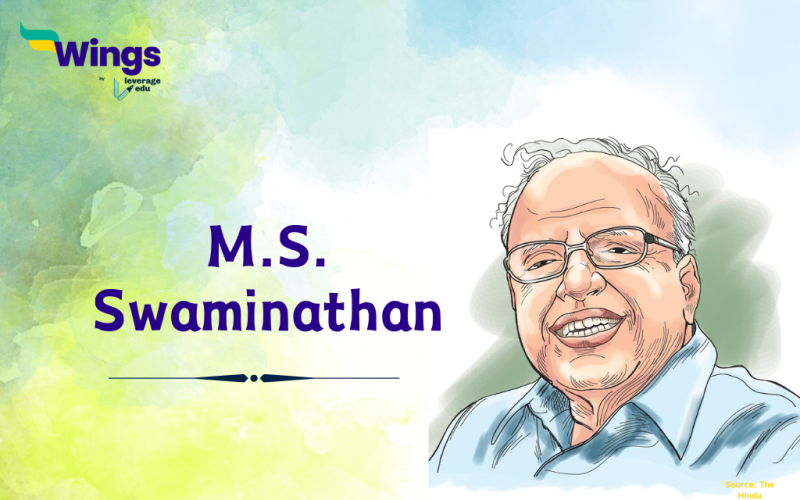Mankombu Sambasivan Swaminathan, also known as the father of India’s green revolution, was an Indian agronomist, agricultural scientist, and humanitarian. He was the main architect of the Green Revolution in India and introduced the development of several varieties of wheat and rice. Read this blog to learn more about M.S. Swaminathan’s life.
Table of Contents
| Overview Of M.S. Swaminathan | |
| Famous As | Father of Green Revolution |
| Life | 1925-2023 |
| Occupation | Agricultural Scientist |
| Achievement | Led India’s Green Revolution and favoured food security |
| Organization | Director General of the Indian Council of Agricultural Research and also the Leader of the International Rice Research Institute |
| Awards | Bharat RatnaWood Food PrizePadma VibhushanShanti Swarup Bhatnagar Award |
M.S. Swaminathan: Early Life and Education
Swaminathan was born in Kumbakonam, Madras Presidency, on August 7, 1925.
- Swaminathan was the second son of M.K. Sambasivan and Parvati Thangammal Sambasivan
- His father died when he was just 11 years old.
- He decided to devote his life to providing a sufficient amount of food to the people of India after he saw the devastation caused by the Bengal Famine in 1943
- In 1947, he joined the Indian Agricultural Research Institute (IARI) in New Delhi to study genetics and plant breeding.
- Swaminathan then became a UNESCO fellow at the Wageningen Agricultural University’s Institute of Genetics in the Netherlands for eight months
- Swaminathan returned to India in early 1954. There were no jobs in his specialization, and it was only three months later that he received an opportunity from a former professor to work temporarily as an assistant botanist at the Central Rice Research Institute in Cuttack.
- In 1972, he was appointed director-general of the Indian Council of Agricultural Research.
- Swaminathan founded the Nuclear Research Laboratory at the IARI. He participated in and promoted the establishment of the International Crop Research Institute for the Semi-Arid Tropics in India.
Also read: Who Is The Father Of Economics
M.S. Swaminathan Contributions
| Contribution | Achievement | Impact |
| Development of High-Yielding Varieties | Introduced disease-resistant wheat and rice varieties. Developed the world’s first high-yielding basmati rice. | Increased Food Production In India |
| Improved Agricultural Practices | Promoted the use of fertilizers and irrigation systems. Encouraged crop rotation and soil conservation techniques. | Promoted sustainable farming practices. |
| Green Revolution | Promoted the evolution of the Green Revolution | Transformed India from a food-deficient to a food-sufficient nation. |
M.S. Swaminathan: Awards and Honours
Some of the awards and honours of M.S. Swaminathan are –
| Award | Year |
| First World Food Prize | 1987 |
| Padma Shri | 1967 |
| Padma Bhushan | 1972 |
| Padma Vibushan | 1989 |
| Ramon Magsaysay Award | 1971 |
| Albert Einstein World Science Award | 1986 |
FAQs
M.S. Swaminathan is known as the “Father of India’s Green Revolution” for his pioneering work in agricultural science and his role in significantly increasing food production in India.
He received several prestigious awards, including the Bharat Ratna, the World Food Prize, Padma Vibhushan, and the Shanti Swarup Bhatnagar Award, in recognition of his contributions to agriculture and food security.
After completing his education in genetics and plant breeding, Swaminathan joined the Indian Agricultural Research Institute (IARI) and later became a UNESCO fellow at Wageningen Agricultural University. He dedicated his career to agricultural research and played a crucial role in various institutes and initiatives aimed at improving crop yields and food availability in India.
Relevant Blogs
This was all about M.S. Swaminathan If you want to know more about other Famous Personalities then visit our General Knowledge page!
 One app for all your study abroad needs
One app for all your study abroad needs













